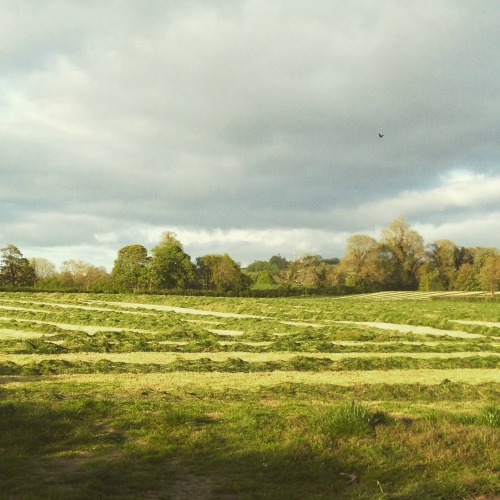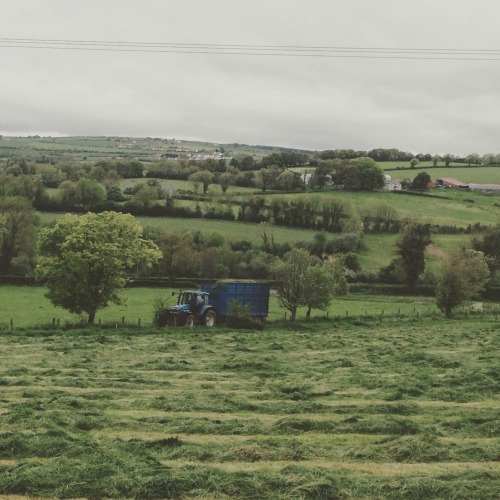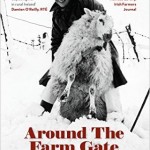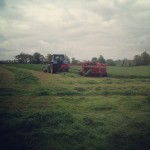The Silage Is In
This week was all about silage and slurry. (Silage is grass that is cut and chopped, brought to a concrete pit and packed in tight. When covered with polythene and tyres to keep the air out, it stays preserved until the cattle eat it in the winter – it’s important to get it in as dry as possible). ?The contractors had a few problems with the mowing which meant it was dragged out a bit but it was all in the silage pits by Wednesday morning, just before the showers came down. It’s been a blustery and cold end to May here. It’s the bank holiday weekend and I lit the fire last night and have the central heating on at the moment. Mad! The forecast is dire for tomorrow (bank holiday Monday) and there’s no guarantee it’s going to get hot soon either!
The four pits have been covered now too – that’s nearly as big a job. I’m not the best with a roll of cling film so I leave all the sorting out of the polythene to Brian. It was really windy one of the days so we ended up doing it at 9pm when the wind had died down. Standing on a high pit with the wind billowing large sheets of polythene everywhere is not recommended!
Two contractors have been spreading slurry this week, it’s a 1.5 mile drive from the home farm to the outfarm so it’s quite a long draw. That added to me being busy this week too, they might not think that I put in a bit more effort with the dinners but it wasn’t like I could just throw a quick omelette together and make it do. I’m not the best of farmers’ wives when it comes to feeding men as although I’d give the silage men dinner at one-ish if they start early, every one else has to fit into my timetable which means dinner at 3:30. They tended to finish work between 7 and 8 so I just presumed they got their tea/supper at home. Now, my mother and many other farmers’ wives would have given them dinner at one o’clock and tea at six o’clock. Many farmers take pride in feeding visitors and workers well, it is seen as the right thing to do. Others don’t feed them at all. I do think they need a decent meal when they are working such a long day but I’m not the most attentive when it comes to ensuring the dinner is scrumptious!
My dad was only telling me yesterday about the time when farmers here used to go from farm to farm working on the harvest, 18 or 20 farmers all doing the threshing. The ‘host’ farmer’s wife would the one feeding all the helpers and indeed, in some parts of the country, there would be music and a bit of a party with the supper at the end of a long day. When working at one farm, and time was moving past 7pm, my dad cycled home to milk the cows knowing that the only other person to milk was his mother. As the farmer had decided to serve the tea when everyone was finished, it was delayed and my dad missed it. The next day, at the next neighbouring farm, the previous farmer was most upset with my father for going home without his tea and made him promise to never do it again.
Any sales reps that called here years ago would have been sent in to the kitchen to collect the cheque for payment and while in there, they would get a cup of tea and whatever had been freshly baked that day. Reps now say that they rarely see farmers’ wives and indeed, I’d imagine they have targets to meet in any case so don’t have as much time for those chats and cups of tea. According to recent research by Teagasc, 51% of Irish farms have an off farm income.
Did Farm Women Work Harder
Do farm women work harder than male farmers? I’m not sure about nowadays but having interviewed a number of people about farming in the past as well as reading various social studies, I really do believe that farm women worked much harder than men half a century ago. Here’s why:
- Men did the field work, women did the housework and the yard work. For women, that would have included milking cows, feeding calves, feeding pigs, feeding hens and other poultry, collecting eggs, making butter, selling eggs, collecting water, washing churns, bringing churns to the end of a lane to be collected, cooking meals, washing clothes, mending clothes, getting children to school, being pregnant, looking after babies, knitting, baking and darning. As one interviewee said to me (the mother of seven children), ‘sure, we hadn’t time to even think about morning sickness’.?Men ploughed, reaped and binded, they went to the mart, they milked cows at times. In some parts of the country, men went abroad to work for part of the year and that wouldn’t have been easy work but the women kept the home fires burning by doing the farming and looking after the children.
- Was it the same with farmers’ daughters – did they work harder than farmers’ sons? In some families, they did. They had to help out with the field work and saving the turf while also doing the yard work, collecting water and cooking meals. While the males might sit down at the table and wait for dinner to be served to them, the girls would be doing the serving up and the washing up and then rushing back to the field to help. In some parts of the country, the females had to wait until the men and boys had finished before they could sit down to eat. My father’s sisters didn’t do that much work in the yard, none of them milked cows for example although all would have taken a week off school every October to pick the potatoes. My grandmother milked some of the cows. According to my dad, she was brilliant at it and could ‘put a hole in the bucket such was her strength’ (that means that the force of the stream of milk from the cow’s udder would almost go through the bottom of the bucket) whereas my grandfather would almost put a cow dry as he was slow at milking!
- Many women didn’t drive so it was the man who went to town to do the shopping and would stop off at the pub or call into friends for a chat, safe in the knowledge that the wife and children were milking the cows and doing whatever other work needed to be done. My paternal grandmother rarely left the farm, her only regular outing was the monthly Mothers Union meeting. As she didn’t drive, my grandfather did the grocery shopping – well, he left the list into the shop and came back to collect the shopping. In the interim, he would call to see his brother who owned a radio shop on the same street. Sunday was a day of rest for farmers with only the necessary feeding and milking being done. I had presumed that going to church was a bit of a rest for farm women as at least they could sit there doing nothing but my grandmother (who I always saw as really religious) never went to church when the children were young. It was too difficult to keep the stove going at a regular temperature and getting the dinner cooked if she wasn’t there so she would cook the dinner and sing hymns while doing so. Although she rarely went anywhere, they always had plenty of visitors on Sunday afternoons. Lots of cakes and apple tarts would have been baked on the Saturday afternoon in preparation.
- Horses got tired so field work couldn’t go late into the night until tractors were introduced. Therefore, the work for men had to end at a relatively reasonable hour even during the busiest times of the year. Even when women sat down in the evenings, there were always socks to be darned or jumpers to be knitted.
I’m really enjoying doing the historical research for the book. As with Would You Marry A Farmer?, the first section wil be historical, looking at the lives of farm women from the past.
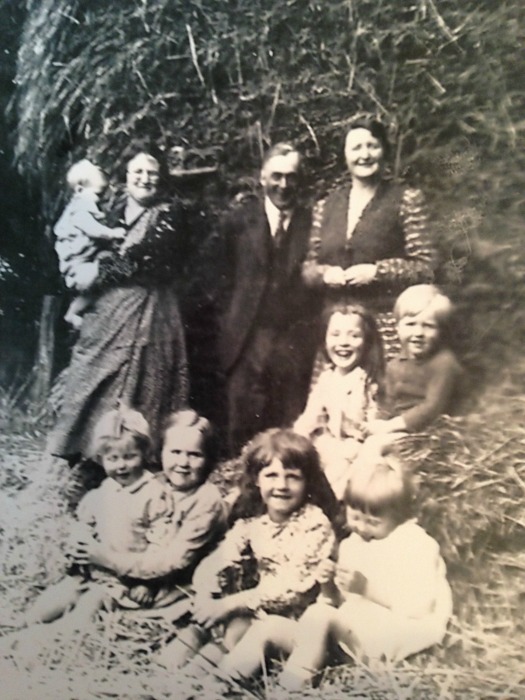 This photo is from 1938. It’s my grandmother on the top left, wearing her usual housecoat to protect her clothes. My grandfather always wore a loose collared white shirt, waist coat and often a jacket, even when making hay! The other lady is one of my great aunts. My dad is the baby, the youngest of the seven children there (there was 9 in the family in the end).
This photo is from 1938. It’s my grandmother on the top left, wearing her usual housecoat to protect her clothes. My grandfather always wore a loose collared white shirt, waist coat and often a jacket, even when making hay! The other lady is one of my great aunts. My dad is the baby, the youngest of the seven children there (there was 9 in the family in the end).
Farm women also had to cope with seasonality in terms of food and food shortages during the rationing of WW2 that continued for many years afterwards. I’ve been looking through some old recipe books and found this one the other day. Many recipes referred to eggs being expensive and also being scarce at particular times of the year. My maternal grandmother used to store eggs in glycerine and water and then when the price of eggs went up close to Christmas, she would sell all the eggs available and use the stored eggs for her own baking. These recipes focus on cakes that are eggless or use fewer eggs than normal.
How is Book Number 2 Going?
How To Be A Perfect Farm Wife is coming along nicely – I think! I go through stages of panicking to then thinking all will be fine. It is 3.5 months to the book launch and I keep reminding myself that I did the whole of the first book in that length of time – although I wouldn’t like to be working at that speed again! Most of it is in draft now although it still needs a lot of work, most of the sections are fairly complete. I still have some research to do but that will be slotted in as it gets done. I’ve a deadline to get it to my editor for next weekend. The first edit is simply going to be for feedback on the content, suggestions for improvements and to let me know if I’m doing anything particularly daft or irritating in my writing. I had planned to get Brian to read it first but considering he falls asleep after reading about six lines, I’m not too sure how successful that will be. Not from boredom, I hasten to add but because he is sleep deprived at the moment!
By the way, once I get it to the editor, I’m going to be sending out my newsletter so if you’d like to receive it, do sign up here. And the book launch will be on 11th September in Kilkenny so I’d love if you put that in your diary!
[xyz-ihs snippet=”Marry-A-Farmer”]






